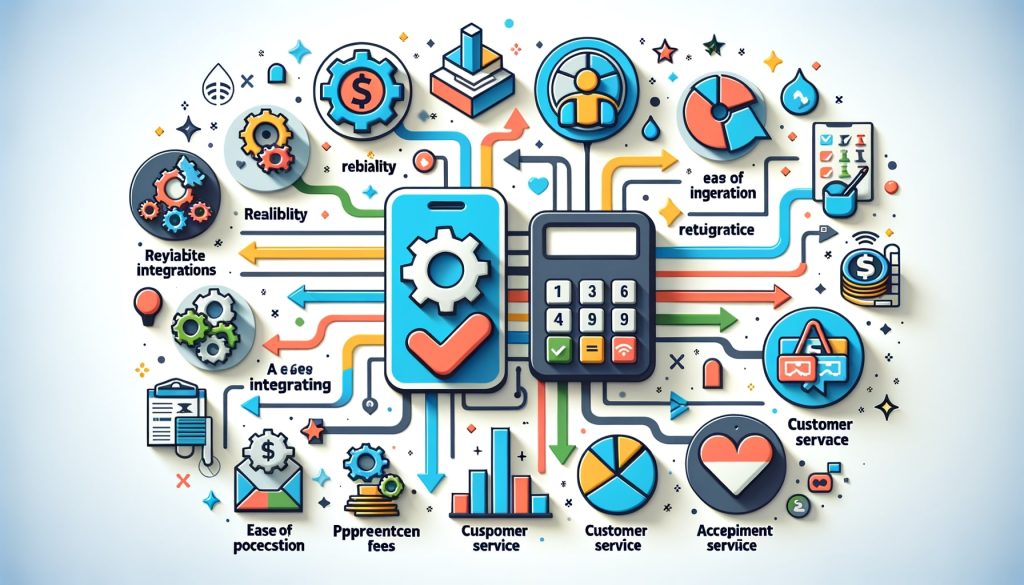By alphacardprocess October 17, 2024
In today’s business environment, accepting a wide range of payment methods is essential for maintaining customer satisfaction and ensuring business growth. Whether you’re operating a small eCommerce store or running a large dental practice, selecting the right payment processor is critical to streamline your financial transactions, reduce costs, and offer a seamless payment experience to your customers.
This guide explores what a payment processor is, why it’s important to choose the right one, and the steps and factors involved in selecting the best payment processor for your business. We’ll cover everything from transaction fees and security features to scalability and customer support.
What Is a Payment Processor?
A payment processor is a third-party company that manages the transaction process between the merchant (your business) and the customer’s bank or card issuer. The processor handles everything from verifying the payment details to transferring the funds into your business account, ensuring that all parties in the transaction are properly credited or debited.
How Payment Processors Work
When a customer initiates a transaction, whether in-person or online, the payment processor securely transfers the payment information between the customer’s bank and the merchant’s acquiring bank. Here’s a simplified overview of the process:
- Authorization: The payment processor contacts the issuing bank to verify if the customer has sufficient funds and that the payment method is valid.
- Authentication: The processor ensures that the transaction details are correct and that there is no fraud involved.
- Settlement: Once the transaction is authorized, the payment processor facilitates the movement of funds from the customer’s account to the merchant’s account.
- Reporting: The processor provides reports on completed transactions, fees, and any chargebacks or disputes.
Payment processors typically charge fees for their services, which are a combination of fixed fees per transaction and a percentage of the transaction amount.
Why Choosing the Right Payment Processor Matters

Choosing the right payment processor is crucial because it affects various aspects of your business, from your bottom line to your customer experience. Here’s why it matters:
1. Cost Control
Transaction fees can add up quickly, especially for businesses that process a large volume of payments. If you select a payment processor with high fees, it can significantly reduce your profit margins. Understanding the fee structure of different processors and choosing one that fits your budget can lead to cost savings in the long run.
2. Security and Fraud Prevention
Security is a major concern when it comes to handling customer payment data. A reliable payment processor ensures that transactions are protected using advanced encryption technologies, PCI DSS compliance, and other security measures. Choosing a payment processor with a solid reputation for security minimizes your exposure to fraud and data breaches.
3. Customer Satisfaction
A smooth and reliable payment process improves the overall customer experience. A payment processor that offers a variety of payment methods, fast transaction speeds, and easy-to-use platforms can enhance your customers’ satisfaction and encourage repeat business.
4. Scalability and Growth
As your business grows, your payment processing needs may become more complex. The right payment processor should offer scalable solutions that can grow with your business, such as support for higher transaction volumes, multiple currencies, or international payments. Selecting a processor with these capabilities ensures that you won’t have to switch providers as your business expands.
Key Factors to Consider When Choosing a Payment Processor

There are several factors to consider when evaluating payment processors. Understanding these factors will help you choose a processor that aligns with your business needs and goals.
1. Transaction Fees and Pricing Models

Transaction fees are one of the most critical factors to assess when choosing a payment processor. These fees can vary widely depending on the processor, the type of transaction (e.g., in-person, online, mobile), and the payment method used (credit card, debit card, ACH). Most processors use one of the following pricing models:
- Flat-Rate Pricing: In this model, the processor charges a fixed percentage and sometimes a fixed fee per transaction (e.g., 2.9% + $0.30 per transaction). This is a simple and predictable pricing structure, but it may not offer the lowest rates, especially for businesses with high transaction volumes.
- Interchange Plus Pricing: Interchange Plus pricing is more transparent, as the processor passes the interchange fee (set by the card networks) to the merchant, along with a small markup (the “plus” part). This model is typically more cost-effective for businesses that process a lot of credit card payments because it allows you to see the actual cost of each transaction.
- Tiered Pricing: Transactions are categorized into different pricing tiers (qualified, mid-qualified, and non-qualified). Qualified transactions have the lowest fees, while non-qualified transactions, which are typically higher risk, incur higher fees. This model can be less transparent and often more expensive for certain transaction types.
You should carefully review the fee structure of each payment processor and compare it to your transaction volume and the types of payments you process most frequently.
2. Supported Payment Methods
To accommodate the preferences of your customers, it’s important to choose a payment processor that supports a wide variety of payment methods. At a minimum, your processor should accept:
- Credit and Debit Cards: Ensure support for all major card networks, including Visa, Mastercard, American Express, and Discover.
- Mobile Wallets: Mobile payments through platforms like Apple Pay, Google Pay, and Samsung Pay are becoming increasingly popular, particularly among younger consumers.
- Digital Wallets and Payment Apps: Some consumers prefer using digital wallets or payment apps such as PayPal or Venmo for online purchases.
- ACH and eCheck Payments: ACH payments can be a cost-effective option for businesses that process large transactions, such as those in B2B or subscription-based industries.
- Buy Now, Pay Later (BNPL) options: Processors that support BNPL services like Klarna, Afterpay, and Affirm can provide your customers with more flexibility in making payments.
Choosing a payment processor that supports multiple payment methods ensures that you can cater to a broader customer base.
3. Security and PCI Compliance

Security should be a top priority when selecting a payment processor. Your chosen processor must comply with the Payment Card Industry Data Security Standard (PCI DSS), which sets guidelines for securely processing and storing cardholder information. A PCI-compliant processor will help you avoid penalties for non-compliance and protect your business from security breaches.
Additionally, look for payment processors that offer the following security features:
- Encryption: Secure data encryption helps prevent unauthorized access to sensitive payment information.
- Tokenization: Tokenization replaces sensitive payment information with a randomly generated identifier, or “token,” that can be safely stored and transmitted.
- Fraud Prevention Tools: Some processors offer advanced fraud detection services, including Address Verification Service (AVS), Card Verification Value (CVV) checks, and machine-learning algorithms to flag suspicious activity.
4. Integration with Your Existing Systems
Your payment processor should integrate seamlessly with your existing systems, such as your point-of-sale (POS) system, eCommerce platform, or accounting software. This ensures that your payment process is efficient, and that payment data flows smoothly into other parts of your business, like inventory management or sales tracking.
For online businesses, it’s crucial to ensure that your payment processor integrates well with your shopping cart or eCommerce platform (e.g., Shopify, WooCommerce, Magento). For physical locations, you’ll want to ensure that your processor integrates with your POS system.
5. Customer Support
Payment processing issues can arise at any time, and having reliable customer support is essential for minimizing downtime and ensuring business continuity. Look for payment processors that offer 24/7 support, preferably through multiple channels such as phone, email, and live chat.
6. Speed of Payouts
The time it takes for funds from a transaction to be deposited into your business account can vary between payment processors. Some processors offer next-day or even same-day payouts, while others may take two or three business days. If cash flow is a concern for your business, choosing a processor with faster payout times may be beneficial.
7. Scalability and Flexibility
As your business grows, your payment processing needs will change. The right payment processor should be able to grow with you by offering scalable solutions, including the ability to process higher transaction volumes, support for multi-currency payments, or the ability to handle international transactions.
If your business expands into new markets or adds additional revenue streams, such as online sales or subscriptions, your processor should have the flexibility to accommodate these new needs.
FAQs
Q1: What is the difference between a payment processor and a payment gateway?
A payment processor facilitates the transaction between the business, the customer, and the bank. A payment gateway is the software that securely transmits payment information from the customer to the processor. For online payments, both a payment processor and gateway are required.
Q2: How can I reduce my transaction fees?
To reduce transaction fees, consider negotiating with your payment processor for lower rates, especially if you have high transaction volumes. Choosing the right pricing model (such as Interchange Plus) and encouraging customers to use lower-cost payment methods (such as debit cards or ACH transfers) can also help lower fees.
Q3: Are there any hidden fees I should look for?
Yes, payment processors may charge various fees beyond the basic transaction fees, including setup fees, monthly service fees, chargeback fees, PCI compliance fees, and termination fees. Be sure to request a full breakdown of all fees from the payment processor before signing a contract.
Q4: Can I switch payment processors if I’m unhappy with my current one?
Yes, you can switch payment processors, but be sure to review any early termination fees or contract terms that could make switching costly. Before switching, compare several processors to ensure you’re getting better rates and service from your new provider. It’s important to confirm that the new processor integrates with your existing systems and offers the features that fit your business needs. Switching can also involve some transition time, so plan accordingly to avoid disruptions in your payment processing.
Q5: How long does it take to receive payments?
The time it takes to receive payments, known as the settlement period, varies by payment processor. Typically, it can take 1-3 business days for the funds to be deposited into your business account. Some processors offer faster payouts, such as next-day or even same-day settlements, which can be useful for businesses with tight cash flow.
Q6: Do all payment processors offer fraud protection?
Not all payment processors offer the same level of fraud protection. Some include basic tools like CVV verification and Address Verification Service (AVS), while others provide more advanced fraud detection services that use machine learning and analytics to identify potential fraudulent transactions. Choose a processor with robust fraud prevention tools to protect your business from chargebacks and fraudulent activity.
Q7: What should I look for in a payment processor’s contract?
Before signing a contract with a payment processor, carefully review the terms and conditions to identify any hidden fees or long-term commitments. Look for details on setup fees, monthly fees, PCI compliance fees, and chargeback fees. Also, be cautious of early termination fees that may lock you into a contract. It’s always a good idea to choose a processor with flexible contract terms and no early termination fees.
Conclusion
Choosing the right payment processor is a vital decision for the success of your business. From controlling transaction fees to ensuring secure, reliable payment methods, your payment processor plays a key role in how efficiently your business can operate and grow. Understanding the differences in pricing models, supported payment methods, security features, and scalability options will help you make an informed decision.
Whether you are running a brick-and-mortar store, an online business, or both, you need a payment processor that aligns with your business needs and budget. Focus on finding a processor that offers transparent pricing, seamless integration with your systems, excellent customer support, and strong security features to protect your business and your customers.
By thoroughly researching and comparing multiple payment processors, you can select a provider that not only improves your payment experience but also enhances customer satisfaction and contributes to the long-term success of your business.